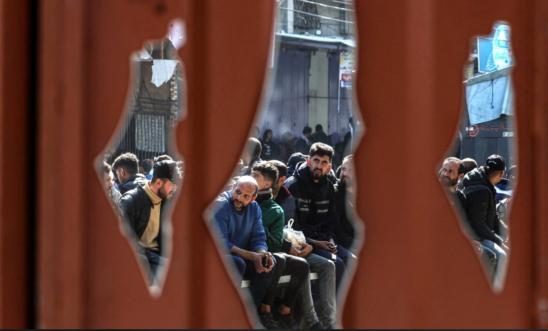
Press releases
Israel/OPT: fresh call for end to Israel's 'brutal' occupation of Palestinian land

Israel must end its brutal occupation of Gaza and the West Bank, including East Jerusalem, said Amnesty International today, ahead of public hearings at the International Court of Justice this week examining the legal consequences of Israel’s prolonged occupation.
Hearings are taking place in The Hague from 19 to 26 February after the UN General Assembly adopted a resolution in 2022 to request an advisory opinion from the court on the legality of Israel’s policies and practices in the Occupied Palestinian Territories.
More than 50 countries, the African Union, the Arab League and the Organisation of Islamic Cooperation are set to participate in the proceedings.
Under international humanitarian law, occupation of a territory during a conflict is meant to be temporary and the occupying power is required to administer the territory in the interest of the occupied population.
Already spanning more than half a century, Israel’s occupation has failed to align with this basic principle of international humanitarian law. Israel’s illegal annexation of occupied East Jerusalem and de facto annexation of large swathes of the West Bank through land confiscation and settlement expansion are clear evidence that Israel intends the occupation to be permanent and for the sole benefit of the occupying power.
Gaza remains occupied even after the withdrawal in 2005 of Israeli forces and the removal of settlers, with Israel retaining control of borders, territorial waters, air space and the population registry. For 17 years, Israel’s illegal blockade of Gaza has also severely restricted the movement of people and goods, devastating the economy. In addition, repeated military attacks have killed and injured thousands of civilians and destroyed large swathes of housing and infrastructure.
Palestinians living under Israeli occupation are subjected to multiple human rights violations, maintained by an institutionalised regime of systematic domination and oppression. Discriminatory and repressive laws - ostensibly adopted as part of the occupation but effectively serving the objectives of Israel’s system of apartheid - have fragmented and segregated Palestinians across the territories while unlawfully exploiting resources.
Ending the occupation would mean restoring Palestinians’ rights by lifting the blockade on Gaza, dismantling Israeli settlements in the West Bank, including East Jerusalem, and reversing illegal annexation. It would allow Palestinians to move freely in the areas where they live and allow families separated by different legal identification systems - such as the Jerusalem residency and those operative in West Bank or Gaza - to be reunited. It would alleviate mass suffering and end widescale human rights violations. It would also, stressed Amnesty, contribute to tackling one of the root causes of recurrent violence and war crimes against Israelis, thus helping to secure justice and reparation for victims on all sides.
Agnès Callamard, Amnesty International’s Secretary General, said:
“Israel’s occupation of Palestine is the longest and one of the most deadly military occupations in the world.
“For decades it has been characterised by widespread and systematic human rights violations against Palestinians.
“The occupation has enabled and entrenched Israel’s system of apartheid imposed on Palestinians.
“All states must review their relations with Israel to ensure that they are not contributing to sustaining the occupation or the system of apartheid.
“The world must recognise that ending Israel’s illegal occupation is a prerequisite to stopping the recurrent human rights violations in Israel and the Palestinian Territories.”
Military offensives and illegal settlements
Even before the latest devastating hostilities, Palestinians in Gaza had been subjected to numerous Israeli military offensives - at least six between 2008 and 2023. During those offensives, Amnesty has documented a recurrent pattern of unlawful attacks amounting to war crimes and even crimes against humanity, while the enduring blockade constitutes collective punishment and is also a war crime.
In the West Bank, including occupied East Jerusalem, Palestinians routinely face an excessive use of force, unlawful killings, arbitrary arrest, administrative detention, forced displacement, home demolitions, confiscation of land and natural resources, and a denial of fundamental rights and freedoms. Israel’s multi-layered closure system, fortified by mass surveillance, physical barriers and legal restrictions - including an illegal wall/fence, hundreds of checkpoints and roadblocks, and an arbitrary permit regime - has curtailed Palestinians’ freedom of movement and perpetuated their disenfranchisement. Among the most glaring examples of Israel’s outright disregard for international law has been the establishing and incessant spread of Israeli settlements and the illegal annexation of occupied East Jerusalem immediately after the 1967 war. There are currently at least 300 illegal Israeli settlements and outposts in the West Bank, including in occupied East Jerusalem, with a population of more than 700,000 Israeli settlers.
Israel’s draconian system of control over the Occupied Territories includes a large network of military checkpoints, fences/walls and military bases and patrols, as well as a string of repressive military orders. Israel’s control of the territories’ borders, of the population registry, of the supply of water, electricity, telecommunication services, of humanitarian and development assistance, and the imposition of its currency, have all had devastating effects on the economic and social developments of the Palestinian people. This control has reached unprecedented levels of cruelty in Gaza where Israel has maintained a 17-year illegal blockade which has been further tightened since 9 October. The blockade, coupled with Israel’s recurrent military operations, has plunged Gaza into one of the gravest humanitarian and human rights crisis of modern times.
Advisory opinion
On 30 December 2022, the UN General Assembly adopted resolution A/RES/77/247, in which it asked the International Court of Justice for an advisory opinion on key questions regarding the legal consequences arising from Israel’s prolonged occupation, settlement and annexation of Palestinian territory since 1967, including how Israel’s policies and practices affect the legal status of the occupation and what legal consequences may arise for all states and the UN. The court is expected to issue its advisory opinion later this year.